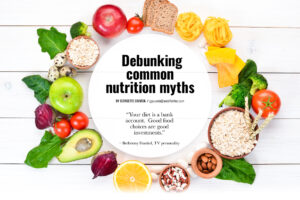Debunking common nutrition myths

In today’s world, where information is readily available at our fingertips, it’s easy to fall victim to nutrition myths that circulate widely online and in popular media. From fad diets to questionable health claims, separating fact from fiction can be a daunting task. However, understanding the science behind nutrition can help us make informed choices about our diets and overall health. Let’s bust some common nutrition myths:
Myth 1:
Carbs are the enemy
Carbohydrates often get a bad rap, with many diets demonizing them as the culprit behind weight gain and health issues. However, not all carbs are created equal. Whole grains, fruits and vegetables provide essential nutrients and fiber that are crucial for good health. The key is to focus on complex carbohydrates and avoid excessive consumption of refined sugars and processed foods.
Myth 2:
Fat makes you fat
The belief that eating fat leads to weight gain has been debunked by numerous studies. Indeed, healthy fats, such as those found in avocados, nuts, seeds and fatty fish, are an essential part of a balanced diet. These fats are important for brain health, hormone production and the absorption of fat-soluble vitamins. It’s the type and quantity of fat consumed that matters most.
Myth 3:
Eating late at night causes weight gain
The timing of meals has little effect on weight gain compared to the overall quality and quantity of food consumed. While it’s not advisable to eat a heavy meal right before bed, snacking on healthy options like yogurt, nuts or fruit in the evening is unlikely to lead to weight gain. What matters more is the total number of calories consumed throughout the day and the balance of nutrients in your diet.
Myth 4:
All calories are created equal
While it’s true that calories are a measure of energy, not all calories have the same effect on our bodies. Foods with different macronutrient compositions (protein, carbohydrates and fats) can have varying effects on hunger, metabolism and overall health. For example, 100 calories of broccoli are not the same as 100 calories of soda, due to differences in nutrient density and fiber content.
Myth 5:
Detox diets rid the body of toxins
The idea that detox diets or cleanses are necessary to rid the body of toxins is not supported by scientific evidence. Our bodies have highly efficient detoxification systems, including the liver, kidneys and lymphatic system, which work continuously to eliminate waste and toxins. Instead of restrictive detox diets, focus on consuming a balanced diet rich in fruits, vegetables, whole grains and lean proteins to support your body’s natural detoxification processes.
 Do your due diligence
Do your due diligence
It’s essential to approach nutrition with a critical eye and rely on evidence-based information rather than succumbing to common myths and misconceptions. By staying informed and making educated choices about our diets, we can optimize our health and well-being for the long term. Remember, there are no quick fixes or one-size-fits-all solutions when it comes to nutrition. Opt for balance, variety and moderation for a healthy lifestyle.
For more, visit giovanniroselli.com.